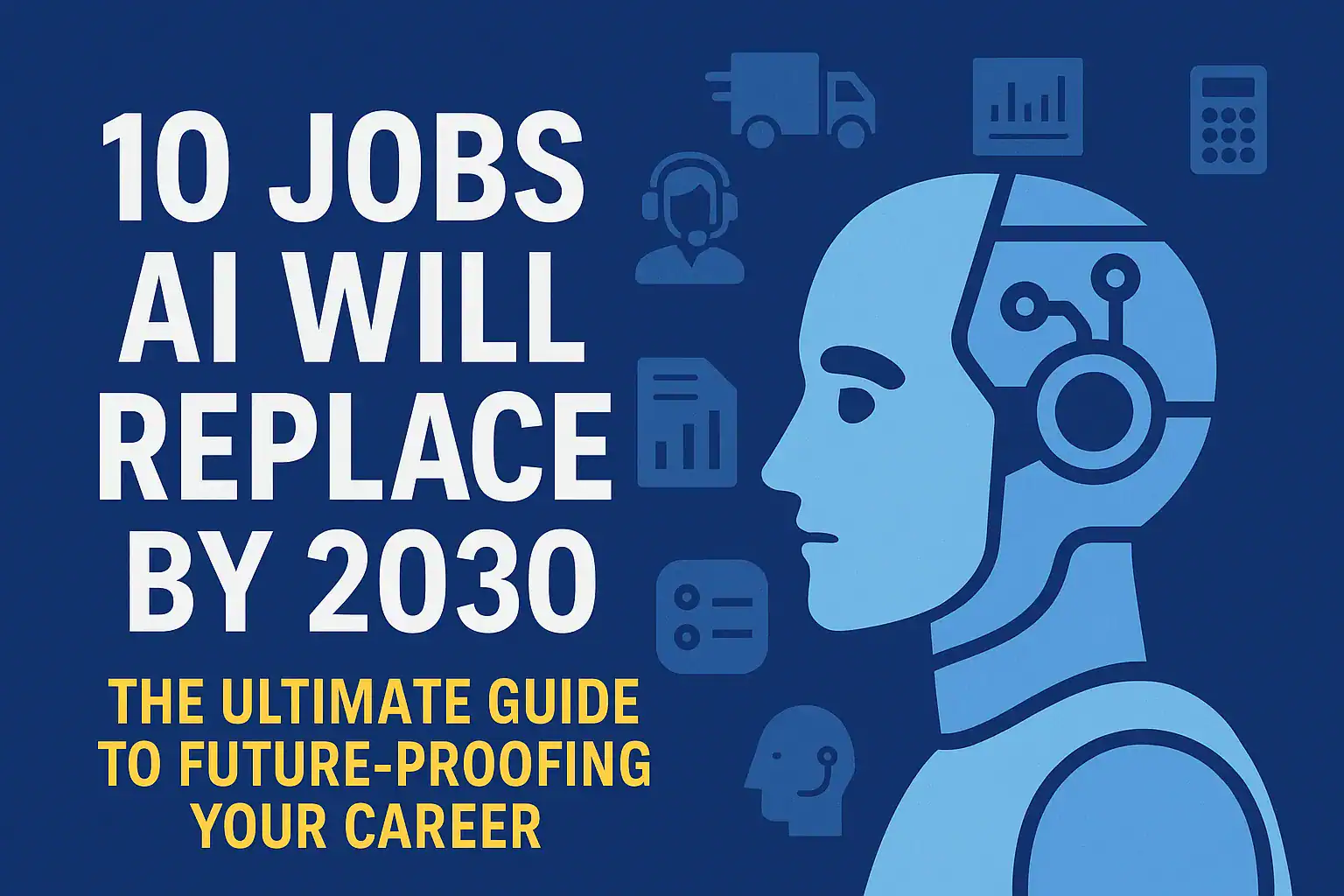Artificial Intelligence (AI) is rapidly transforming the job market
Artificial Intelligence (AI) is rapidly transforming the job market, sparking both excitement and fear. Experts estimate that by 2030, AI automation could impact up to 30% of jobs in the U.S. Roles involving repetitive, routine tasks are especially vulnerable as AI systems become more sophisticated at handling everything from data entry to driving. According to a report by McKinsey, up to 375 million workers globally may need to switch occupational categories due to automation by 2030. At the same time, AI is creating new opportunities and augmenting many professions rather than completely obliterating them. In this ultimate guide, we’ll explore which jobs are at highest risk of replacement, which careers remain safe from automation, and how you can future-proof your skillset in an AI-driven world.
Top 10 Jobs at High Risk of AI Replacement by 2030
AI is particularly good at automating tasks that are predictable, data-intensive, or rule-based. This puts a variety of white-collar and blue-collar jobs in the crosshairs. Below are 10 roles experts highlight as most likely to be replaced or radically changed by AI in the near future: A study by the World Economic Forum predicts that by 2025, 85 million jobs may be displaced by a shift in labor between humans and machines.
1. Data Entry Clerks
Perhaps the most classic example of automation. Modern AI with optical character recognition can accurately digitize and organize data far faster than humans, greatly reducing the need for manual data entry. By 2030, nearly all straightforward data entry tasks may be handled by algorithms and bots. According to a report from the International Federation of Robotics, the global stock of operational robots is expected to reach 20 million by 2030, significantly enhancing automation capabilities.
2. Telemarketers
AI voice bots and chatbots are increasingly handling sales calls and customer outreach. Conversational AI can dial prospects, deliver scripted pitches, and respond to basic inquiries with natural-sounding speech. Because AI callers don’t tire and can call thousands of leads simultaneously, traditional telemarketing roles are quickly vanishing.
3. Retail Cashiers
The rise of self-checkout kiosks and AI-powered retail systems is slowly phasing out cashier positions. Automated checkout machines and computer vision (as seen in “grab-and-go” stores) let customers pay without human assistance. By 2030, many stores may operate with minimal checkout staff, relying on AI-driven payment technology to handle transactions.
4. Truck and Delivery Drivers
Autonomous vehicles and delivery drones are under active development and testing. Companies are investing heavily in self-driving trucks and AI navigation for deliveries. By 2030, long-haul trucking and routine delivery routes could be largely automated, putting driving jobs at risk once AI proves safer and more cost-effective at transporting goods.
5. Bookkeeping and Accounting Clerks
Routine accounting tasks like invoice processing, payroll, and reconciling accounts are increasingly handled by AI-driven software. For example, AI bookkeeping tools can categorize expenses and flag anomalies instantly. Studies suggest roughly 20% of accounting work could be automated by 2030. The traditional bookkeeping role will likely shrink, with remaining human accountants focusing on oversight and complex financial analysis.
6. Customer Service Representatives
Basic customer support is already being handled by AI chatbots and virtual assistants. These bots can answer frequently asked questions, track orders, or handle simple troubleshooting 24/7 at low cost. Many companies now use AI for first-line support and only escalate complex issues to human agents. By 2030, front-line call center and online support jobs may be heavily reduced, with humans handling only the most complex or sensitive customer issues.
7. Administrative Assistants
Scheduling meetings, managing calendars, sorting emails, and other routine admin tasks can be done by smart assistants. AI tools (like voice-activated schedulers and email triage systems) are automating the traditional secretary role. An AI can coordinate calendars, book travel, and draft routine documents in seconds. While executive assistants who handle high-level coordination will still exist, many entry-level admin tasks will be offloaded to AI by 2030.
8. Basic Graphic Designers
The creative field is not immune. Generative AI design tools (like DALL·E or Midjourney for images) can now produce logos, layouts, and graphics based on simple prompts. They threaten jobs focused on simple, template-based design work. A business owner can ask an AI to “create a flyer for a sale,” and get a usable design in moments. Designers who do repetitive graphic tasks or simple logo designs may see demand decline, whereas those who do high-end creative branding will collaborate with AI tools rather than be replaced.
9. Entry-Level Programmers
Even software development faces disruption. AI coding assistants (like GitHub Copilot and ChatGPT’s code generation abilities) can write and debug chunks of code automatically. For routine programming tasks or bug fixes, AI can dramatically increase productivity. This doesn’t mean software engineers will vanish – but junior developers who mainly produce boilerplate code could be fewer in number. Developers will need to focus on higher-level architecture, complex problem-solving, and supervising AI-generated code.
10. Market and Data Analysts
Analyzing large datasets for trends is a forte of AI. Machine learning algorithms can sift through data, generate reports, and even make predictions (e.g. sales forecasts or market research summaries) much faster than an entry-level analyst. Roles that involve collecting and processing data – from basic market research to financial analysis – are being augmented by AI that can handle the heavy lifting. Human analysts will still be needed to define strategy and interpret nuanced insights, but the number of purely data-crunching analyst jobs may decline by 2030.
Why These Jobs?
The common thread among most roles above is repeatable procedures and predictable patterns. If a task follows a set of rules or past examples, an AI or robot can be trained to do it. We’re already seeing this in action – from fast-food kiosks to automated warehouse robots and AI-powered chatbots, many industries are embracing automation for efficiency. Jobs that involve physical precision in controlled environments (manufacturing assembly lines) or straightforward paperwork and digital tasks have been under automation pressure for years. AI advancements simply accelerate this trend, expanding it into new areas like driving, sales calls, and creative content generation.
Jobs and Skills That Are Safe from AI
Not every profession is easily handed off to machines. Roles that require uniquely human traits – creativity, empathy, judgment, and complex strategic thinking – remain difficult for AI to replicate. Here are some careers unlikely to be replaced by AI in the foreseeable future:
- Healthcare Professionals (Doctors, Nurses, Therapists): These roles demand empathy, ethical judgment, and hands-on care. AI can assist with diagnosing or record-keeping, but human health workers are needed for their clinical experience and compassion in patient interactions.
- Creative Arts & Design: While AI can generate images or mimic writing styles, it lacks the true originality and emotional depth of human creators. Professions like writers, artists, filmmakers, and UX designers who craft original narratives and designs will use AI as a tool, but human imagination and cultural understanding keep these careers safe.
- Educators and Coaches: Teaching involves much more than delivering content. Great teachers and coaches provide mentorship, adapt to student needs, and inspire through personal connection.
- Skilled Trades: Trades like electricians, plumbers, carpenters, and mechanics work in dynamic real-world environments that are hard for robots to navigate.
- Mental Health & Social Services: Roles such as psychologists, counselors, social workers require deep human empathy and understanding of nuance in personal situations.
- Senior Leadership & Strategic Roles: High-level business roles (executives, project managers, strategists) involve big-picture thinking, ethical decision-making, and leadership abilities.
The Human Advantage
In general, jobs that pair advanced technical know-how with interpersonal skills will thrive. AI lacks true common sense, emotional intelligence, and the ability to handle unstructured problems. Professions centered on human connection, creativity, and complex decision-making will continue to be led by people. Moreover, many roles will evolve rather than vanish – for example, teachers might use AI tools for grading so they can focus more on mentoring students.
New Careers Emerging from the AI Revolution
- AI Ethics & Policy Specialists – Experts who develop guidelines to ensure AI is used responsibly and without bias.
- Data Scientists and AI/Machine Learning Engineers – Professionals who train AI models, analyze large datasets, and help organizations leverage AI for insights.
- AI Maintenance & Robotics Technicians – Technicians who install, repair, and maintain AI-driven machines (from warehouse robots to autonomous vehicles) will be crucial as automation spreads.
- Prompt Engineers and AI Trainers – A new breed of specialists who fine-tune AI language models (like ChatGPT) by crafting effective prompts or curating training data, ensuring the AI produces useful outputs.
- Cybersecurity Analysts (AI specialization) – Security experts are needed to combat AI-driven cyber threats.
How to Future-Proof Your Career in the Age of AI
- Embrace Lifelong Learning: Continuously update your technical skills. Take courses on AI, data analytics, or other in-demand technologies.
- Develop Critical Thinking: Focus on high-level problem-solving skills that machines can’t easily replicate.
- Boost Emotional Intelligence (EQ): Skills like communication, empathy, teamwork, and leadership set you apart from AI.
- Increase Digital Literacy: Become comfortable working alongside AI tools.
- Adaptability and Flexibility: Be open to evolving your role.
Conclusion
AI is undeniably reshaping the employment landscape. Yes, AI will replace some jobs by 2030, especially those filled with repetitive, routine tasks. But it’s not an apocalypse for human work. Many roles will remain essential, and countless new ones will emerge, from AI maintenance to data ethics. History shows that with each technological leap, the nature of work changes – and society adapts.
The key is to approach AI as a tool, not a threat. By focusing on what makes us uniquely human – creativity, empathy, adaptability, and complex thinking – we can partner with AI to achieve even greater productivity and innovation. The future belongs to those who are proactive and resilient. Upgrade your skills, stay curious, and be ready to lead through change. If you do, you’ll not only survive the AI revolution – you’ll thrive in it.

